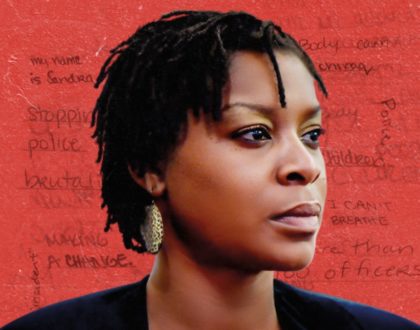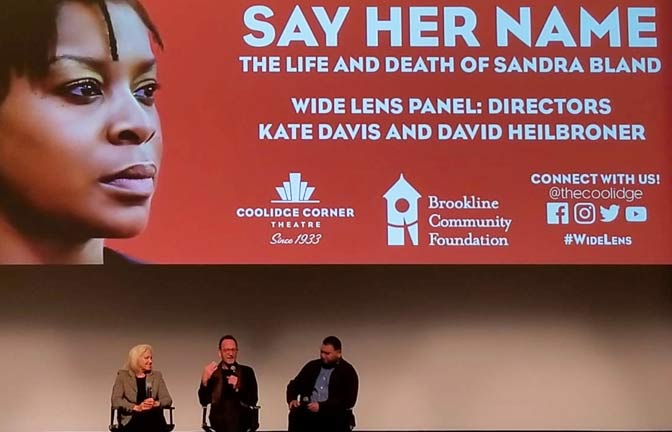Say Her Name: The Life and Death of Sandra Bland

Say Her Name: The Life and Death of Sandra Bland premiered on HBO December 3, 2018. The documentary follows the aftermath and events leading up to Sandra Bland’s death. In July of 2015, 28-year-old Black Lives Matter civil rights activist Sandra Bland was found dead in a jail cell in Waller County, Texas. Her death occurred three days after being stopped by police officer Brian Encinia for a traffic violation and later getting arrested for allegedly assaulting the law enforcement official. Bland’s body was found hanging from an improvised noose devised from the plastic liner of a trash receptacle left in the cell. Her death occurred just one week after Bland moved back to Texas to pursue a job opportunity at Prairie View A&M University, from which she had previously earned a degree.
Several theories began to circulate soon after Bland’s death; including that her death was a result of police brutality and that she was already dead when she arrived at the Waller County jail, that she was killed by police officers at the jail who later staged her death, and that she was mistreated and abused at the Waller County jail resulting in a debilitated state of mind that precipitated her suicide.
Following Sandra Bland’s death, HBO contacted several filmmakers with the idea of producing a documentary investigating the circumstances surrounding her death and its impact on the community. Kate Davis and David Heilbroner were two of the filmmakers contacted for this project. After reviewing some of their previous work–which includes documentaries such as The Newburgh Sting, Stonewall Uprising, and Southern Comfort–Bland’s family agreed to participate in Davis and Heilbroner’s documentary. During the next two years, the filmmakers followed Bland’s family and their efforts to learn about what happened to Sandra while she was in police custody.
Say Her Name: The Life and Death of Sandra Bland relies on dash camera footage from the patrol car, surveillance footage from the Waller County jail, interviews with Bland’s attorney, family, friends, and members of the police department, as well as new footage intertwined with excerpts from Bland’s vlog Sandra Speaks. In her videos, Bland invited her fellow “kings and queens” to become aware of the manifestations of systemic racism and encouraged everyone to educate themselves and have conversations across racial differences.
Although the film focuses on Bland’s perspective through snippets from her video blogs and interviews with her family, it also allows Waller County officials to recount their perspective of the events. Ultimately, the film does not explicitly “choose a side” or attempt to decisively answer whether or not there was foul play involved. The documentary, however, sheds light on several incidents that indicate negligence from Waller County officials, including falsified jail records that reveal that Bland was placed in solitary confinement and was not checked on by anyone for three days leading up to her death. There are no records for most of the phone calls placed from jail by Bland. Additionally, Bland’s attorney, Cannon Lambert, highlights Waller County officials’ poor preservation of evidence and reveals that officers and reporters were allowed inside Bland’s cell shortly after her death before all investigations were complete.
Ultimately, officer Brian Encinia was indicted for perjury in 2015 after lying to a grand jury about Bland’s traffic stop. In June of 2017, those charges were dropped in exchange for Encinia’s surrender of his Texas law enforcement license, meaning that no one was ever held criminally liable for Bland’s death, or her arrest, which many experts have concluded may have been illegal. Nearing the documentary’s conclusion, County Sheriff R. Glenn Smith sustains his position that his office did no legal wrongdoing, but concedes that on the matter of “moral responsibility” the jail failed Bland and her family. Bland’s sisters Sharon Cooper and Shante Needham said that was the closest thing they ever got to an apology or admission of wrongdoing.
Regarding the death of Sandra Bland and the circumstances surrounding it, the public is quick to ask, “What could the victim have done to prevent their own death?” Yet, when it comes to discrimination, the onus of responsibility should not fall on those facing it but rather on those perpetuating it. In reality, Bland’s death was precipitated by bias, profiling, and police brutality which manifested themselves as a result of racism and sexism. Time and again, we have seen people of color, particularly black people, being targeted, threatened, fined, arrested, and even killed while performing day-to-day activities such as waiting for friends at Starbucks, being at home, visiting family, driving with your partner and 4-year-old daughter, going to work, gardening, attempting to study at a library, babysitting, swimming in neighborhood pools or at the pool in their own apartment complexes, being an 8-year-old selling water, napping in a dorm common room, waiting for an Uber, and most recently here in Boston, being a college professor on your way to class at the Massachusetts College of Art and Design. Unfortunately, these injustices happen on a daily basis and do not receive the mainstream media coverage they deserve. Their occurrence can be followed via the hashtags #WhileBlack and #LivingWhileBlack, where individuals, journalists, and activists report on the dangers of existing in both public and private spaces while being black. (The Root has compiled a list of 100 Things Not to Do #WhileBlack.)
We should ask ourselves, as Sandra Bland’s family did and as this documentary does, would a white woman have gotten stopped over a missed turn signal to then have a police officer escalate the interaction into a confrontation? Would a police officer have slapped a white man inside his own car, as officer Encinia did to Sandra Bland? Do white people need to fear for their lives during routine interactions with police officers? It seems unlikely. White individuals who are resisting arrest, badgering police officers or have just murdered multiple people are often taken into custody alive and unharmed. The same cannot be said for black individuals, whether they are engaging in criminal activity or not, who too frequently end up dead at the hands of police. In fact, this has spurred several compilations of online videos titled White people with guns not getting shot by cops.

What can allies do?
Use our voices
White allies can call attention to and demand accountability for acts of discrimination. The criminal justice system and access to justice is skewed against people of color. Systems of oppression silence the voices of those who are most affected, such as women and people of color. And victims tend to be blamed or discredited.
In the same way filmmakers Kate Davis and David Heilbroner did, white allies can utilize their privilege, access to resources, and the fact that their voices are often perceived as more credible to put pressure towards accountability. Nevertheless, let’s not forget to…
Recognize our own biases and that there is always more to learn
We are all impacted by and contribute to systems of oppression. Deconstructing long-standing beliefs, attitudes, and behaviors requires willingness and time. As filmmaker David Heilbroner recognized during a Boston screening of Say Her Name: The Life and Death of Sandra Blandat the Coolidge Corner Theater, even those with good intentions can benefit from taking a step back to recognize that there can be room for improvement. During the post-film talkback with the film’s directors, an audience member asked them how they “grappled with their identity and privilege when making the film.” The filmmakers stated that, first and foremost, they listened to Bland’s family and hoped that by using their resources and privilege, they would be able to help fulfill the family’s wish–that Sandra Bland’s story would become known on a national scale. Later on, Heilbroner recounted a moment when he received a call from Bland’s family after he “crossed a line [he] didn’t even know existed” during a recent Q&A. During said Q&A, Heilbroner recounted his first meeting with the family’s attorney, Cannon Lambert. He described his first impression of Lambert as a “scary man” when he “should have referred to him as an intimidatingly good lawyer and fierce advocate for his client.” Bland’s family indicated how such comments can perpetuate the “scary black man” stereotype. Would Heilbroner have referred to a tall, confident white lawyer as “scary”? Research says likely not, as people tend to see black men as larger and more threatening than similarly sized white men. And finally…
Advocate for the victim, not the victimizer
Increasingly, we are seeing individuals and media outlets expressing sympathy for victimizers under the guise of presenting a fair representation of both sides. This includes publicly supporting sexual abusers or publishing sympathetic character profiles on white nationalists. When asked about how much thought they put into balancing the voice of Bland and her family versus the voice of Waller County police officers, filmmaker David Heilbroner stated that they aimed to maintain a balance of the two given that “demonizing one side does not start conversations.” Heilbroner expressed surprise, and borderline commendation, at the fact that Waller County District Attorney Elton Mathis admitted to a jail employee falsifying logs. Heilbroner went on to say, “You have to give it up to the guy. Officials don’t often admit when they’ve committed fraud on the record […] They’re trying, they’re failing, but they’re trying.” On the subject, Kate Davis added, “It must have been really hard for the officers to have the new Black Panther group approach the jail and come in. That was really hard for them and must have left scars.”
It’s important that we recognize that, historically, abusers and those belonging to privileged groups are more likely to have multiple opportunities to tell their side of the story, have their voices be heard, and sometimes face little repercussions for their actions if any. Sexual abusers, for instance, often don’t end up having to register as sex offenders, end up serving reduced sentences, if any, and are able to keep their jobs or come back after a brief “hiatus.” White individuals who behave anti-semitically or commit acts of racism rarely face repercussions proportional to the acts they committed. They are often labeled “lone wolves” and their racial group does not suffer from generalizations based on individual actions.
We owe it to the victims whose lives were cut short or irrevocably impacted to push towards accountability and reparations. Because if facing consequences disproportional to your actions seems hard, imagine being systematically oppressed, subject to violence or death, and not being able to grieve, heal or receive warranted justice. Let’s make space for victims and their families. Say her name. Sandra Bland.
You can watch Say Her Name: The Life and Death of Sandra Bland now on HBO.
